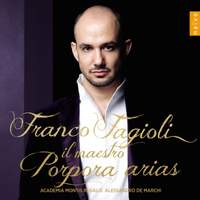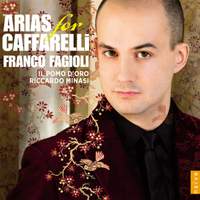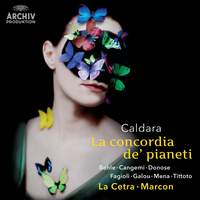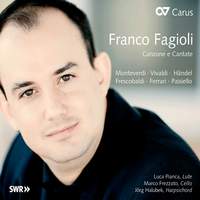Interview,
Franco Fagioli on Porpora
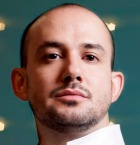 Tomorrow evening, the Wigmore Hall will host the UK recital-debut of one of the most astonishing and unusual singers around at the moment, the Argentine countertenor Franco Fagioli: possessed of a robust, full voice covering over three octaves and capable of extraordinary feats of agility, Fagioli won widespread acclaim for his Arias for Caffarelli disc last year and for his knock-out performances as Arbace in Leonardo Vinci's Artaserse (staged by Parnassus Arts and recorded for Virgin), but so far has never given a solo concert in the UK. (Though he's around in London rather a lot for the next month or two: he'll also make his Royal Opera debut in just over a month as Idamante in Idomeneo, the first time that role will have been sung by a countertenor in the house's history.)
Tomorrow evening, the Wigmore Hall will host the UK recital-debut of one of the most astonishing and unusual singers around at the moment, the Argentine countertenor Franco Fagioli: possessed of a robust, full voice covering over three octaves and capable of extraordinary feats of agility, Fagioli won widespread acclaim for his Arias for Caffarelli disc last year and for his knock-out performances as Arbace in Leonardo Vinci's Artaserse (staged by Parnassus Arts and recorded for Virgin), but so far has never given a solo concert in the UK. (Though he's around in London rather a lot for the next month or two: he'll also make his Royal Opera debut in just over a month as Idamante in Idomeneo, the first time that role will have been sung by a countertenor in the house's history.)
Franco has given relatively few interviews to date, so I jumped at the opportunity to quiz him a little last week about his discovery of that extraordinary voice - and about his new disc on Naive Records, a collection of arias by the great Neapolitan composer and singing-teacher Nicola Porpora…
How did you discover your voice, and in particular that remarkable upper extension?! Did you initially train as a different voice-type, and was it difficult to gain early experience with such an unusual instrument?
Well the fact about discovering my voice comes from when I was a child. I was singing in a boy’s choir as a soprano, and I was very lucky to sing all the solo parts in the pieces we used to perform. Actually I was also selected to sing the first boy in Mozart’s The Magic Flute, so I think all these great experiences were very important to me and remain in my mind. Later my voice changed and I focused my studies on the pianoforte, although I never stopped singing as a joke, with my high voice, like imitating sopranos. But I thought I just was making fun: I didn’t know that the countertenor voice could be a real vocal register till one day I went to a CD shop. At that time I was looking for any CD of Pergolesi’s Stabat Mater, so I bought a CD and went home. When I started to listen, of course I recognized a soprano voice, and an alto voice, but this alto voice had a different sound. Then I read on the back of the CD case and discovered that the alto part was sung by a man (James Bowman). So immediately I realized that what I was doing as a joke, imitating sopranos, was actually a vocal register, the countertenor. In that moment I decided that I would like to become a singer in the countertenor register.
About the upper extension, well, when I started my singing lessons I discovered I had high notes too, but they were not yet good enough to be used properly. So I kept working on the technique to improve them and to know how to sing it as properly as possible. I did not train as a different voice-type ever; I started from the beginning as a countertenor. To gain experience with this kind of instrument was simply through practising what one learns from the teacher
Are these male or female roles, or a mixture of the two? Is there a difference in Porpora’s writing for male and female characters?
In the Porpora album I chose a selection of arias for different singers, both male and female, and different kind of works: opera, oratorio, and cantatas. I would not say that there is a difference in the writing depending on whether the voice is male or female: I would say that the difference comes from the particular singer for whom the particular aria was written, and yes, often the castrato arias are the most difficult arias to sing because these singers were particularly trained to sing the most difficult vocal passages.
Porpora was of course a great singing teacher as well as a fine composer: do you think this comes across in his music at all, and what special challenges does his music throw up in comparison to his contemporaries?
For the singers, especially castratos, they were made to work in a very special way, to the point where they spent a year doing the same type of exercise. And until that exercise was perfectly performed, they would not start on another. They were like athletes: they could do arpeggios, trills, scales almost automatically, because they were trained. Then those passages of exercise are seen in Porpora’s musical compositions - Porpora wrote in his musical line passages that often were used also as a vocalization.
Who were these arias written for - any of Porpora’s famous pupils? And do you feel a particular connection to any of the great castrati?
Yes, there are some arias written for Farinelli for example. But the idea of this CD for me was not to focus on a particular singer but on Porpora as a singing- teacher and how that was reflected in his music. I feel a deep admiration for the castrati: personally I like to think when I am studying a particular aria for a particular singer, that is possible to try some kind of spiritual knowledge of the interpreter by singing the music composed for him.
Il Maestro is out on Naive Records on 29th September, and includes arias from Polifemo, Ezio, Semiramide riconosciuta and more; Fagioli is accompanied by the Academia Montis Regalis under Alessandro de Marchi.
Available Formats: MP3, FLAC
Recent and forthcoming recordings featuring Franco Fagioli
One of the outstanding records of 2013, this collection of arias by eighteenth-century Neapolitan composers including Cafaro, Hasse, Vinci, Pergolesi and more showcases Fagioli's enormous range, phenomenal agility and prodigious lung-capacity in performances that were described as 'jaw-dropping' (The Guardian) and 'astonishing' (Gramophone).
Available Formats: MP3, FLAC, Hi-Res FLAC
Due out on 13th October, this world premiere recording of Caldara's serenata is directed by Andrea Marcon (who discovered and edited the manuscript) and features Fagioli and German tenor Daniel Behle in leading roles.
Available Formats: MP3, FLAC, Hi-Res FLAC
This 2010 recording includes chamber-arias by Frescobaldi, Monteverdi, Ferrari and Paisiello as well as Vivaldi's cantato 'Pianti, sospiri e dimandar mercede'.
Available Formats: MP3, FLAC


